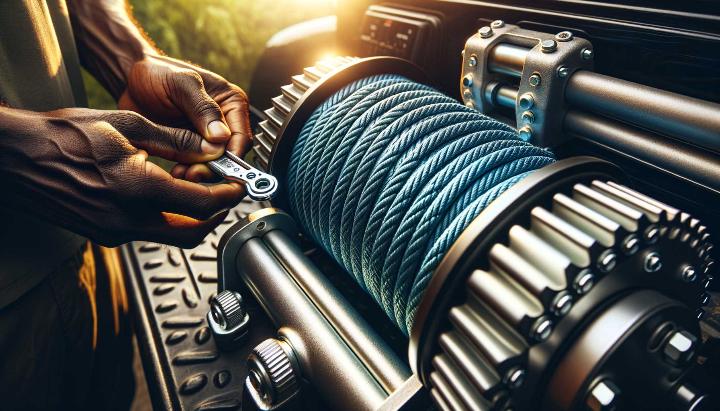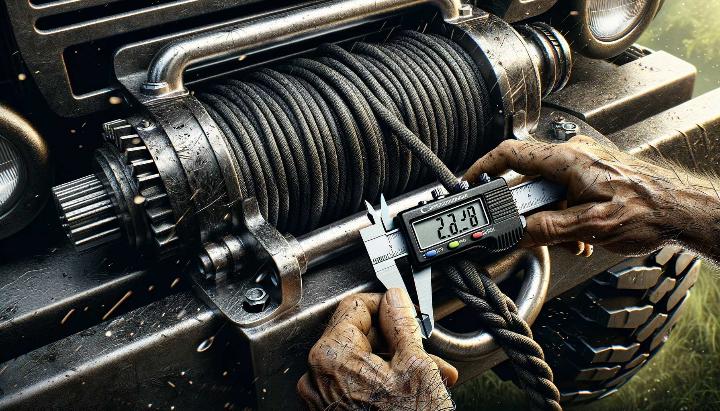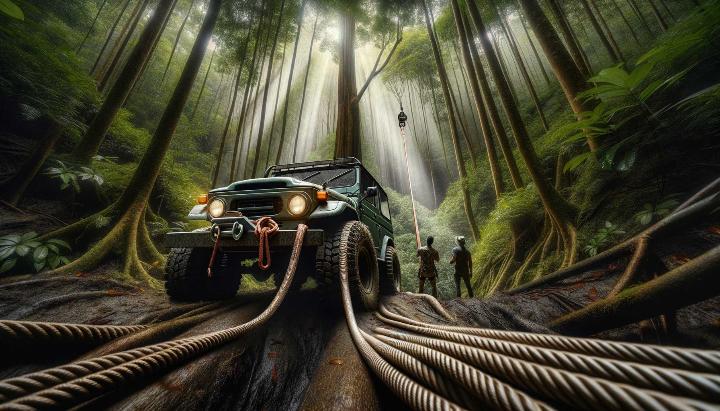Have you ever found yourself in a sticky situation, your 4x4 bogged down in unforgiving terrain, only to realise your winch cable isn't up to the task? It's a heart-sinking moment that can turn an adventure into a nightmare. But here's the kicker: choosing the right winch cable size isn't just about brute strength—it's an art form that balances power, weight, and versatility.
Welcome to IROPES' comprehensive guide on winch cable sizes and manila rope essentials. As Australia's leading rope manufacturer, we've seen it all—from weekend warriors tackling local trails to commercial operators pushing the limits in extreme conditions. Today, we're pulling back the curtain on the secrets to selecting the perfect winch cable and manila rope for your needs.
In this guide, we'll explore:
- The critical factors that influence winch cable size selection
- IROPES' recommended winch rope diameter range and popular lengths
- The often-overlooked advantages of manila rope in winching operations
- Expert tips for customising your winch setup for optimal performance
Whether you're a seasoned off-roader or just getting started, understanding the nuances of winch cable and manila rope sizes can be the difference between conquering challenges and calling for a tow. So, buckle up and get ready to dive into the world of winch ropes—your next adventure depends on it!
Understanding Winch Cable Size
When it comes to off-road recovery or heavy-duty towing, selecting the right winch cable size is crucial. As an avid off-roader, I've learned that the difference between a successful recovery and a potentially dangerous situation often comes down to the winch cable's specifications. Let's dive into the factors that influence winch cable selection and why it's so important to get it right.
Factors Affecting Winch Cable Selection
Choosing the appropriate winch cable size isn't just about picking the thickest rope you can find. Several key factors come into play:
- Winch pulling power: This is the cornerstone of your selection process. Your cable's strength must match or exceed your winch's maximum pulling capacity.
- Vehicle weight: Consider not just your vehicle's weight, but also any additional load you might be carrying.
- Safety factor: Always aim for a safety margin. A general rule of thumb is to choose a cable with a breaking strength 1.5 to 2 times your winch's rated capacity.
- Intended use: Are you mainly doing light-duty recovery, or do you frequently tackle challenging terrains?
Choosing the Right Winch Cable Diameter
Winch cable diameter directly affects its breaking strength. Common sizes include:
- 3/16" (4.8mm)
- 5/16" (8mm)
- 3/8" (9.5mm)
Remember, thicker isn't always better. While a thicker cable offers more strength, it also adds weight and reduces the amount of cable your winch drum can hold. For most recreational off-roading, a 5/16" synthetic rope strikes a good balance between strength and versatility.
Winch Cable Length Considerations
Standard winch rope lengths typically range from 18 to 30 meters. The ideal length depends on your specific needs:
- 18 meters: Suitable for light-duty applications and smaller vehicles.
- 23 meters: A versatile option for most recreational off-roading scenarios.
- 30 meters: Ideal for heavy-duty applications or when extra reach is necessary.
When in doubt, it's better to have a bit more length than you think you'll need. You can always use a tree saver strap to extend your reach if necessary.
Using the wrong winch cable size can lead to cable failure, equipment damage, or even personal injury. Always prioritise safety and consult with experts if you're unsure about the right specifications for your setup.
By understanding these key aspects of winch cable selection, you'll be better equipped to choose the right size for your needs. Remember, the goal is to balance strength, weight, and functionality to ensure safe and effective winching operations in any situation you might encounter on the trail.
IROPES' Winch Rope Diameter Range and Supply Options
When it comes to winch ropes, size matters. At IROPES, we understand that choosing the right winch rope diameter can make or break your recovery operation. That's why we offer a comprehensive range of winch rope diameters to suit every need, from light-duty recreational use to heavy-duty industrial applications.
Understanding Winch Rope Diameters and Their Applications
The diameter of your winch rope plays a crucial role in determining its strength, weight, and overall performance. As an off-road enthusiast myself, I've learned that bigger isn't always better. Let's break down the most popular winch rope diameters and their ideal applications:
- 5/16" (8mm): Perfect for most recreational off-roading and light-duty recovery. It offers a great balance between strength and weight.
- 3/8" (9.5mm): Ideal for medium-duty applications and larger 4x4 vehicles. This size provides increased strength without significantly adding bulk.
- 1/2" (12.7mm): Suitable for heavy-duty recovery operations and industrial use. It offers maximum strength for the toughest jobs.
Remember, the right diameter depends on your winch's capacity and your specific needs. Always consult your winch's manual for recommended rope specifications.

Choosing the Right Winch Rope Size for Your Needs
Selecting the optimal winch rope size involves considering several factors:
- Winch capacity: Your rope's breaking strength should match or exceed your winch's maximum pull rating.
- Vehicle weight: Heavier vehicles require stronger ropes to ensure safe recovery.
- Intended use: Consider the terrain and frequency of use when choosing your rope diameter.
- Synthetic vs. steel: IROPES specializes in synthetic ropes, which are 8 times lighter than steel and much safer to handle.
At IROPES, we pride ourselves on using top-quality materials like UHMWPE (Ultra-High-Molecular-Weight Polyethylene) in our synthetic winch ropes. This advanced material offers superior strength-to-weight ratio and excellent abrasion resistance.
Did you know? IROPES' synthetic winch ropes have a breaking strength that's up to 30% higher than steel cables of the same diameter, while being significantly lighter and easier to handle.
For more insights into when synthetic rope is preferable and its benefits over traditional options, consider exploring our comprehensive guide on why synthetic rope outperforms winch wire rope.
Our team of experts is always ready to help you choose the perfect winch rope for your specific needs. Whether you're a weekend warrior or a professional recovery operator, IROPES has the right size and strength to keep you pulling strong. Don't hesitate to reach out for personalized recommendations and custom solutions tailored to your unique requirements.
Selecting the Right Manila Rope Size
When it comes to winching operations, choosing the correct manila rope size is crucial for both safety and performance. As someone who's spent years working with various types of ropes, I can tell you that manila rope has its unique charm and advantages. Let's dive into the world of manila rope sizes and discover how to select the perfect one for your needs.
Understanding Manila Rope Characteristics
Manila rope, derived from the fibres of the abaca plant, is a natural wonder in the world of ropes. Its rough texture reminds me of the bark of a sturdy tree, while its golden-brown hue evokes images of sun-baked fields. But it's not just about looks - manila rope boasts impressive strength and durability.
- Natural fibre composition: Manila rope is biodegradable and environmentally friendly.
- High strength-to-weight ratio: It can support heavy loads without being overly bulky.
- Excellent grip: The rough texture provides superior handling, even when wet.
- UV resistance: Unlike some synthetic ropes, manila holds up well under sunlight exposure.
When it comes to grades, yacht grade manila rope stands out as the cream of the crop. It's the strongest and most reliable option, perfect for heavy-duty winching applications.
Factors to Consider When Choosing Rope Size
Selecting the right manila rope size isn't just about going for the thickest option available. Several factors come into play:
- Intended use: Are you using it for light-duty tasks or heavy winching operations?
- Load requirements: Consider both the weight you'll be pulling and any potential shock loads.
- Environmental conditions: Will the rope be exposed to moisture, UV rays, or abrasive surfaces?
- Winch drum capacity: Ensure the rope diameter is compatible with your winch setup.

Here's a quick reference guide for common manila rope sizes and their typical applications:
- 1/4" (6mm): Suitable for light-duty tasks and small craft applications.
- 3/8" (9mm): Ideal for medium-duty winching and general-purpose use.
- 1/2" (12mm): Perfect for heavy-duty winching operations and larger vehicles.
- 5/8" (16mm): Recommended for industrial-grade winching and extreme load requirements.
Calculating Safe Working Load
Understanding the safe working load (SWL) is crucial when selecting your manila rope size. The SWL is typically calculated as a fraction of the rope's breaking strength, usually around 20% for general use. Here's a simple formula:
SWL = Breaking Strength ÷ Safety Factor
For manila rope, a safety factor of 5 is commonly used. Let's look at a practical example:
A 1/2" manila rope has a breaking strength of approximately 2,400 kg. Using a safety factor of 5, the SWL would be: 2,400 kg ÷ 5 = 480 kg
Remember, these calculations are general guidelines. Always consult with rope experts or manufacturers for specific recommendations, especially for critical winching operations.
For those interested in the advantages that synthetic options could offer over natural fibres in certain conditions, explore our article on brown polypropylene and nylon ropes.
At IROPES, we understand the importance of selecting the right manila rope size for your winching needs. Our team is always ready to provide expert advice and custom solutions to ensure you get the perfect rope for your application. Don't hesitate to reach out - we're here to help you make the right choice for safe and efficient winching operations.
Popular Winch Cable Lengths and Their Applications
When it comes to winching, one size definitely doesn't fit all. As an off-road enthusiast who's been in countless recovery situations, I can tell you that choosing the right winch cable length is crucial for a successful and safe operation. Let's dive into the world of winch cable lengths and explore how IROPES caters to various needs.
Standard Winch Cable Lengths from IROPES
At IROPES, we offer a range of standard winch cable lengths to suit different applications. Our most popular options include:
- 50 feet (15 meters): Ideal for light-duty vehicles and basic recovery scenarios.
- 85 feet (26 meters): A versatile length suitable for most off-road vehicles and recovery situations.
- 100 feet (30 meters): Perfect for heavy-duty applications and when extra reach is needed.
- 125 feet (38 meters): Designed for extreme recovery situations and commercial use.
Each of these lengths has its own sweet spot in terms of application. For instance, I remember a time when my 85-foot winch cable saved the day during a particularly tricky recovery in a deep ravine. The extra length gave us the flexibility we needed to anchor to a sturdy tree that was just out of reach of a standard 50-foot cable.

Choosing the Right Winch Cable Size for Your Needs
Selecting the appropriate winch cable size involves considering several factors:
- Vehicle weight and type: Heavier vehicles require stronger cables with higher breaking strengths.
- Winch capacity: Ensure your cable's breaking strength matches or exceeds your winch's maximum pull rating.
- Intended use: Consider the terrain and typical recovery scenarios you'll encounter.
- Storage space: Longer cables take up more space on your winch drum, potentially reducing overall capacity.
Here's a quick guide to help you choose:
- Light-duty (ATVs, UTVs): 50-foot synthetic winch rope with 3/16" to 1/4" diameter.
- Medium-duty (Jeeps, small trucks): 85-foot synthetic winch rope with 5/16" to 3/8" diameter.
- Heavy-duty (Large trucks, commercial vehicles): 100-foot or 125-foot synthetic winch rope with 3/8" to 1/2" diameter.
Remember, these are general guidelines. Always consult your vehicle's manual and consider your specific needs when making a decision.
For a deeper dive into pairing cable size with specific applications and learning about factors such as cost efficiency, explore our guide on 12 strand UHMWPE rope cost efficiency.
Custom Winch Cable Options and Considerations
At IROPES, we understand that sometimes standard lengths just don't cut it. That's why we offer custom winch cable options to meet your unique requirements. Here are some scenarios where custom lengths might be beneficial:
- Specialized recovery operations: When you need extra reach in challenging terrains.
- Compact setups: For vehicles with limited space, where a shorter cable might be preferable.
- Commercial applications: Tailored lengths for specific industrial or commercial uses.
Ordering a custom winch cable from IROPES is a straightforward process. Simply reach out to our team with your requirements, and we'll guide you through the options, considering factors like breaking strength, diameter, and material.
Did you know? IROPES offers both synthetic winch ropes and steel winch cables. Synthetic ropes are 8 times lighter than steel, making them easier to handle and safer in case of breakage.
While custom lengths offer flexibility, they may come with trade-offs. Longer cables might reduce your winch's overall pulling capacity due to increased weight and friction. On the flip side, shorter cables might limit your recovery options in certain situations.
Whether you opt for a standard length or a custom solution, IROPES is committed to providing high-quality winch cables that meet your specific needs. Our team of experts is always ready to help you make the best choice for your winching adventures. So, what's your typical recovery scenario? Are you finding that standard lengths meet your needs, or are you considering a custom solution?
```htmlSelecting the appropriate winch cable size is paramount for safe and effective winching operations. iRopes offers a comprehensive range of winch rope diameters and lengths to meet diverse needs, from off-road explorations to industrial tasks. Their recommended regular supply of winch rope diameter range includes popular sizes like 5/16", ensuring a balance between strength and weight crucial for both recreational and heavy-duty applications. Manila rope sizes also play a critical role, with iRopes providing expert guidance on choosing the right size for your specific requirements. Whether you need a standard length or a customised solution, iRopes' high-quality, winch cable sizes and manila rope sizes cater to every demand.
Submit Your Inquiry for Custom Winch Solutions
Please fill in the form above to get personalised recommendations and solutions tailored to your winching requirements. Our team at iRopes is eager to assist you with expert advice and high-quality, customisable winch ropes that ensure your safety and success.
```